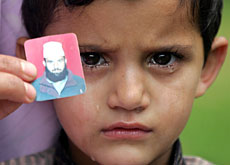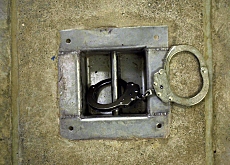ICRC highlights plight of missing people

The International Committee of the Red Cross (ICRC) says not enough is being done for the hundreds of thousands of missing people and their families worldwide.
On the eve of Thursday’s International Day of the Disappeared, the Swiss-run organisation accused the international community of ignoring the tragedy and lacking the political will to do something about it.
“The issue of missing persons in armed conflict and situations of violence is a global one and a deeply unsettling one from a humanitarian perspective,” Pierre Krähenbühl, director of operations, told a news conference in Geneva on Wednesday.
Unveiling a report entitled Missing Persons – A Hidden Tragedy, Krähenbühl said precise figures for the number of missing around the world did not exist.
But it is estimated that between 375,000 and 1,000,000 people are missing in Iraq alone. The ICRC lists 13,500 unaccounted for in Bosnia and Herzegovina, almost 6,000 in Sri Lanka and 950 in Nepal.
According to the ICRC, the right to know the fate of a relative is set down by international humanitarian law and should be respected by all conflict parties.
“However legitimate the grounds for a detention may be at a certain moment, there exists no right to conceal a person’s whereabouts or to deny that he or she is being detained,” said Krähenbühl.
“Families of missing persons undergo immense suffering and are often suspended in a form of limbo, not knowing if their loved ones are alive or dead.”
Mass executions
The report notes the victims of mass executions thrown into unmarked graves in the Balkans, abductions in Sri Lanka, children separated from their families in Congo and dead soldiers left on the battlefield during the Ethiopian/Eritrean war.
The ICRC says the legal obligations for states are laid out in the Geneva Conventions and the new International Convention for the Protection of All Persons from Enforced Disappearance.
The treaty was adopted by the United Nations General Assembly in December last year and has so far been signed by 61 countries – though not by Switzerland.
“We have called – and we call again – on states to sign, ratify and implement that convention,” said Krähenbühl.
The Geneva-based organisation says it is currently handling tens of thousands of cases of missing persons in dozens of countries around the world.
Krähenbühl warned that unless action was taken to resolve the issue, missing persons would remain a “very serious shadow” over the future of many communities, poisoning the process of reconciliation and rebuilding in countries emerging from conflict.
swissinfo, Adam Beaumont in Geneva

More
International Humanitarian Law
On Wednesday the ICRC facilitated the release of 12 South Korean hostages in Afghanistan.
Taliban insurgents in Ghazni Province had held the ten women and two men for more than six weeks.
ICRC staff handed them over to a South Korean delegation in the town of Ghazni. They said the kidnappers told them that the remaining seven Korean hostages would be freed shortly.
The ICRC has been serving as a neutral intermediary at the request of both the rebels and South Korean negotiators.
According to Iraqi public sources, the number of people missing since the Iraq-Iran war (1980-1988) ranges from 375,000 to 1,000,000.
From 2006 to June 2007 some 20,000 bodies were brought to the Medical-Legal Institute in Baghdad. Almost 50% of these bodies were unidentified.
Since 2003, according to some sources, 4,000 unidentified bodies have been buried in special cemeteries in Najaf and Kerbala.

In compliance with the JTI standards
More: SWI swissinfo.ch certified by the Journalism Trust Initiative

You can find an overview of ongoing debates with our journalists here. Please join us!
If you want to start a conversation about a topic raised in this article or want to report factual errors, email us at english@swissinfo.ch.